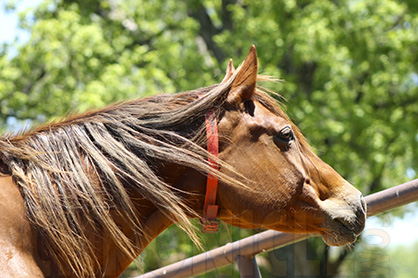Check Broodmare Hay for Fescue
By Kentucky Equine Research Staff
Landowners throughout North America and other continents enjoy the numerous benefits fescue offers as forage. The perennial’s hardiness allows it to thrive despite heavy hoof traffic, intense grazing, and adverse growing conditions. Despite its advantages, some fescue is infected with the specific endophyte, Acremonium coenophialum.
An endophyte is a fungus that grows inside another plant without detriment to the host plant. In some instances, the fungus actually provides benefit to the host plant. Such is the case with Acremonium coenophialum. The fungus produces alkaloids, and these alkaloids protect the plant against certain natural insults such as insects and nematodes. Because of their increased durability, the plants become more tolerant to marginal soils and suboptimal growing conditions.
Most mare owners know the dangers of grazing late-pregnant mares on endophyte-infected tall fescue. The grass causes legions of problems, collectively called fescue toxicosis, in broodmares: prolonged gestation, foaling difficulties, thickened placentas (including “red bag” emergencies), and a decrease or complete absence of milk upon delivery. The ill effects of tall fescue consumption can continue beyond foaling frustrations, as affected mares may be hard to get back in foal, leaving breeders with a smaller foal crop the following year.
Removing mares from endophyte-infected tall fescue 90 days before foaling has been an effective management technique, and newer varieties of tall fescue are endophyte-free, giving breeders peace of mind. These newer varieties, however, do not possess the resiliency of their forebears. Not only are they more susceptible to adverse conditions, these varieties seem to be more difficult to maintain.
While horsemen are usually most concerned with guaranteeing that pastures contain no fescue or endophyte-free fescue, the problem-causing fungus can get into a mare’s diet unintentionally. This is likely to happen in one of two ways, as hay or as bedding.
Providing hay is often a staple of broodmare management in winter months. With pasture plants dormant, forage requirements are usually met by baled hay. High-quality grass hay is usually a suitable choice for broodmares, as it satisfies nutrient requirements without the extra calories and cost of alfalfa hay.
Grass hay is rarely pure, however. With the exception of popular forage types such as timothy or orchardgrass, which may approach a higher level of purity, grass hay is more often than not described as “mixed.” If it is purchased from an unknown buyer, mixed grass hay may include fescue, and that fescue might be infected with endophyte. While fescue is easy to identify in pastures and hayfields, it tends to blend with other grasses as it dries. Like other grasses such as bluegrass and orchardgrass, tall fescue leaves roll into a tight cylinder during the curing process, making a positive identification problematic. Though commercial tests are available to detect the fungus in living plants, there is no such test for the presence of the endophyte in hay.
Fescue is rarely raised exclusively as hay intended for horses. Even when it is, it is usually harvested at a late stage of maturity when palatability and nutrient value are low. Because of palatability issues, horses often waste it, preferring to lie in it than eat it.
Therefore, when purchasing hay for pregnant mares, be sure it is free of fescue. If fescue is discovered, double-check that the plants were harvested from an endophyte-free stand. If this cannot be ascertained definitively, the hay should be fed to other horses or livestock. Endophyte-infected fescue causes few side effects in non-pregnant mares.
Some forage that is unsuitable for consumption by horses ends up being used as bedding. This is a common practice on large farms where many horses are given fresh bedding each night or when straw is in short supply.
Because of its poor nutritional quality when harvested mature, fescue is sometimes chosen as such a bedding.
In some circumstances, mares may consume the bedding, putting themselves at risk for fescue toxicosis. While horses will generally gravitate toward high-quality forage, it is not unusual for some to chomp through a fair amount of bedding. In fact, more than a few horses cannot be bedded on straw because of their penchant for consuming this seemingly bland-tasting forage. As a precaution, an experienced agronomist or other specialist should inspect discarded or inferior forage before it is used to bed down the stalls of mares in late gestation.
Further, used bedding that has been stripped from stalls should not be strewn on fields grazed by mares. Seed may fall from the dried plants and germinate in the field, thus contaminating the fields and giving cause for complete renovation of pasture areas, if they’re to be used for grazing mares. In summary, remember these key points when fine-tuning a management program for broodmares.
• Scrutinize hay for fescue just as carefully as you would analyze pasture. This is especially true for farms that purchase hay from multiple suppliers. The endophyte that causes fescue toxicosis is just as detrimental in hay as it is in fresh forage.
• Choose bedding wisely. While baled pasture clippings may be an economical bedding choice, be sure no fescue plants are intermixed with the other grasses. Even though fescue is not a particularly enticing forage for horses, some mares might stray from their heaps of high-quality hay to add variety to their diets.
• Do not spread soiled bedding that includes fescue waste on pastures that may one day be grazed by mares. The plants may contain seeds that could germinate and grow.











